Fleurs du Mal Magazine


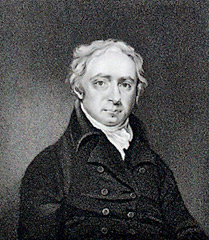
Song of the American Indian
Stranger, stay, nor wish to climb
The heights of yonder hills sublime;
For there strange shapes and spirits dwell,
That oft the murmuring thunders swell,
Of power from the impending steep
To hurl thee headlong to the deep;
But secure with us abide,
By the winding river’s side;
Our gladsome toil, our pleasures share,
And think not of a world of care.
The lonely cayman, where he feeds
Among the green high-bending reeds,
Shall yield thee pastime; thy keen dart
Through his bright scales shall pierce his heart.
Home returning from our toils,
Thou shalt bear the tiger’s spoils;
And we will sing our loudest strain
O’er the forest-tyrant slain!
Sometimes thou shalt pause to hear
The beauteous cardinal sing clear;
Where hoary oaks, by time decayed,
Nod in the deep wood’s pathless glade;
And the sun, with bursting ray,
Quivers on the branches gray.
By the river’s craggy banks,
O’erhung with stately cypress-ranks,
Where the bush-bee hums his song,
Thy trim canoe shall glance along.
To-night at least, in this retreat,
Stranger! rest thy wandering feet;
To-morrow, with unerring bow,
To the deep thickets fearless we will go.
William Lisle Bowles
(1762 – 1850)
Song of the American Indian
• fleursdumal.nl magazine
More in: # Classic Poetry Archive, #Archive Native American Library, Archive A-B, Archive A-B, Cowboys and Indians, Racism, Western Fiction
On the morning of August 12, 2022, Salman Rushdie was standing onstage at the Chautauqua Institution, preparing to give a lecture on the importance of keeping writers safe from harm, when a man in black—black clothes, black mask—rushed down the aisle toward him, wielding a knife. His first thought: So it’s you. Here you are.
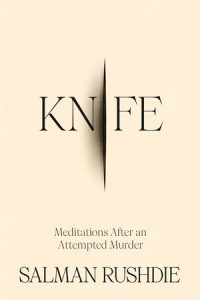 What followed was a horrific act of violence that shook the literary world and beyond. Now, for the first time, and in unforgettable detail, Rushdie relives the traumatic events of that day and its aftermath, as well as his journey toward physical recovery and the healing that was made possible by the love and support of his wife, Eliza, his family, his army of doctors and physical therapists, and his community of readers worldwide.
What followed was a horrific act of violence that shook the literary world and beyond. Now, for the first time, and in unforgettable detail, Rushdie relives the traumatic events of that day and its aftermath, as well as his journey toward physical recovery and the healing that was made possible by the love and support of his wife, Eliza, his family, his army of doctors and physical therapists, and his community of readers worldwide.
Knife is Rushdie at the peak of his powers, writing with urgency, with gravity, with unflinching honesty. It is also a deeply moving reminder of literature’s capacity to make sense of the unthinkable, an intimate and life-affirming meditation on life, loss, love, art—and finding the strength to stand up again.
#1 NATIONAL BESTSELLER • From Booker Prize winner Salman Rushdie, a searing, deeply personal account of enduring—and surviving—an attempt on his life thirty years after the fatwa that was ordered against him.
Salman Rushdie is the author of fifteen novels—Luka and the Fire of Life; Grimus; Midnight’s Children (for which he won the Booker Prize and the Best of the Booker); Shame; The Satanic Verses; Haroun and the Sea of Stories; The Moor’s Last Sigh; The Ground Beneath Her Feet; Fury; Shalimar the Clown; The Enchantress of Florence; Two Years, Eight Months, and Twenty-Eight Nights; The Golden House; Quichotte (which was shortlisted for the Booker Prize); and Victory City—and one collection of short stories: East, West. He has also published five works of nonfiction—The Jaguar Smile; Imaginary Homelands; Step Across This Line; Joseph Anton; and Languages of Truth—and coedited two anthologies, Mirrorwork and Best American Short Stories 2008. He is a member of the American Academy of Arts and Letters and a Distinguished Writer in Residence at New York University. A former president of PEN American Center, Rushdie was knighted in 2007 for services to literature.
Knife:
Meditations After an Attempted Murder
Author: Salman Rushdie
Publisher: Random House
April 16, 2024
Language: English
Hardcover: 224 pages
Price: $28.00
ISBN-10: 0593730240
ISBN-13: 978-0593730249
Dimensions: 5.73 x 0.91 x 8.53 inches
#1 in Censorship & Politics
#4 in Author Biographies
#60 in Memoirs (Books)
• fleursdumal.nl magazine
More in: #Biography Archives, Archive Q-R, Archive Q-R, Awards & Prizes, FDM in New York, Salman Rushdie
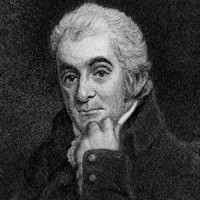
The Sleeping Beauty
Sleep on, and dream of Heaven awhile—
Though shut so close thy laughing eyes,
Thy rosy lips still wear a smile
And move, and breathe delicious sighs!
Ah, now soft blushes tinge her cheeks
And mantle o’er her neck of snow:
Ah, now she murmurs, now she speaks
What most I wish—and fear to know!
She starts, she trembles, and she weeps!
Her fair hands folded on her breast:
—And now, how like a saint she sleeps!
A seraph in the realms of rest!
Sleep on secure! Above control
Thy thoughts belong to Heaven and thee:
And may the secret of thy soul
Remain within its sanctuary!
Samuel Rogers
(1763 – 1855)
The Sleeping Beauty
• fleursdumal.nl magazine
More in: # Classic Poetry Archive, Archive Q-R, Archive Q-R, Grimm, Andersen e.o.: Fables, Fairy Tales & Stories
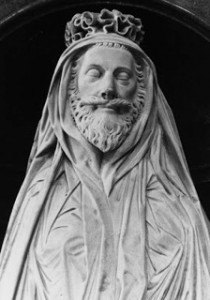
The Rising Sun
Busy old fool, unruly Sun,
Why dost thou thus,
Through windows, and through curtains, call on us ?
Must to thy motions lovers’ seasons run ?
Saucy pedantic wretch, go chide
Late school-boys and sour prentices,
Go tell court-huntsmen that the king will ride,
Call country ants to harvest offices ;
Love, all alike, no season knows nor clime,
Nor hours, days, months, which are the rags of time.
Thy beams so reverend, and strong
Why shouldst thou think ?
I could eclipse and cloud them with a wink,
But that I would not lose her sight so long.
If her eyes have not blinded thine,
Look, and to-morrow late tell me,
Whether both th’ Indias of spice and mine
Be where thou left’st them, or lie here with me.
Ask for those kings whom thou saw’st yesterday,
And thou shalt hear, “All here in one bed lay.”
She’s all states, and all princes I ;
Nothing else is ;
Princes do but play us ; compared to this,
All honour’s mimic, all wealth alchemy.
Thou, Sun, art half as happy as we,
In that the world’s contracted thus ;
Thine age asks ease, and since thy duties be
To warm the world, that’s done in warming us.
Shine here to us, and thou art everywhere ;
This bed thy center is, these walls thy sphere.
John Donne
(1572–1631)
The Rising Sun
• fleursdumal.nl magazine
More in: Archive C-D, Archive C-D, Donne, John

The Sleeper
At midnight, in the month of June,
I stand beneath the mystic moon.
An opiate vapor, dewy, dim,
Exhales from out her golden rim,
And softly dripping, drop by drop,
Upon the quiet mountain top,
Steals drowsily and musically
Into the universal valley.
The rosemary nods upon the grave;
The lily lolls upon the wave;
Wrapping the fog about its breast,
The ruin moulders into rest;
Looking like Lethe, see! the lake
A conscious slumber seems to take,
And would not, for the world, awake.
All Beauty sleeps!—and lo! where lies
Irene, with her Destinies!
Oh, lady bright! can it be right—
This window open to the night?
The wanton airs, from the tree-top,
Laughingly through the lattice drop—
The bodiless airs, a wizard rout,
Flit through thy chamber in and out,
And wave the curtain canopy
So fitfully—so fearfully—
Above the closed and fringéd lid
’Neath which thy slumb’ring soul lies hid,
That, o’er the floor and down the wall,
Like ghosts the shadows rise and fall!
Oh, lady dear, hast thou no fear?
Why and what art thou dreaming here?
Sure thou art come o’er far-off seas,
A wonder to these garden trees!
Strange is thy pallor! strange thy dress!
Strange, above all, thy length of tress,
And this all solemn silentness!
The lady sleeps! Oh, may her sleep,
Which is enduring, so be deep!
Heaven have her in its sacred keep!
This chamber changed for one more holy,
This bed for one more melancholy,
I pray to God that she may lie
Forever with unopened eye,
While the pale sheeted ghosts go by!
My love, she sleeps! Oh, may her sleep,
As it is lasting, so be deep!
Soft may the worms about her creep!
Far in the forest, dim and old,
For her may some tall vault unfold—
Some vault that oft hath flung its black
And wingéd pannels fluttering back,
Triumphant, o’er the crested palls
Of her grand family funerals—
Some sepulchre, remote, alone,
Against whose portals she hath thrown,
In childhood, many an idle stone—
Some tomb from out whose sounding door
She ne’er shall force an echo more,
Thrilling to think, poor child of sin!
It was the dead who groaned within.
Edgar Allan Poe
(1809 – 1849)
The Sleeper
• fleursdumal.nl magazine
More in: - Archive Tombeau de la jeunesse, Archive O-P, Archive O-P, Edgar Allan Poe, Poe, Edgar Allan, Poe, Edgar Allan, Tales of Mystery & Imagination
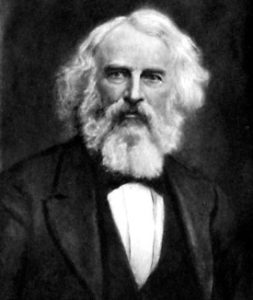
The Arrow and the Song
I shot an arrow into the air,
It fell to earth, I knew not where;
For, so swiftly it flew, the sight
Could not follow it in its flight.
I breathed a song into the air,
It fell to earth, I knew not where;
For who has sight so keen and strong,
That it can follow the flight of song?
Long, long afterward, in an oak
I found the arrow, still unbroke;
And the song, from beginning to end,
I found again in the heart of a friend.
Henry Wadsworth Longfellow
(1807–1882)
The Arrow and the Song
• fleursdumal.nl magazine
More in: Archive K-L, Archive K-L, Longfellow, Henry Wadsworth

Houvast
Kennen wij niets meer dan nagebootste
gebarentaal? Soms, soms is de waarheid
moeilijk. Bij een vraag als Spant de boog
de pees, of kromt de pees de boog? is ons
de grens van wetten te vaag. Er is geen
weerstand zonder tekenen aan de wand.
Van verbeelding geven zij misleidende
straling af, als fosforstronken in het woud.
Houvast: de cartografie van het geheugen,
het register van de weemoed. En natuurlijk,
sterk en zacht als gepolijst olijvenhout,
de eeuwigheid. Die eeuwigheid. ‘O’ zegt
de een er voor, en ‘Ach’ de ander….
Bert Bevers
Houvast
Verschenen in de uitgave ter herdenking van Erik Heyman (1960-2010),
Voorspel, Liedekerke/Aalst, 2010
• fleursdumal.nl magazine
More in: Archive A-B, Archive A-B, Bevers, Bert
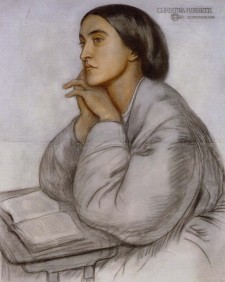
Summer
Winter is cold-hearted
Spring is yea and nay,
Autumn is a weather-cock
Blown every way:
Summer days for me
When every leaf is on its tree;
When Robin’s not a beggar,
And Jenny Wren’s a bride,
And larks hang singing, singing, singing,
Over the wheat-fields wide,
And anchored lilies ride,
And the pendulum spider
Swings from side to side,
And blue-black beetles transact business,
And gnats fly in a host,
And furry caterpillars hasten
That no time be lost,
And moths grow fat and thrive,
And ladybirds arrive.
Before green apples blush,
Before green nuts embrown,
Why, one day in the country
Is worth a month in town;
Is worth a day and a year
Of the dusty, musty, lag-last fashion
That days drone elsewhere.
Christina Georgina Rossetti
(1830 – 1894)
Summer
• fleursdumal.nl magazine
More in: 4SEASONS#Summer, Archive Q-R, Archive Q-R, Rossetti, Christina

Winters erfrecht
Gesloten luiken, gezegende ogen.
Het mededogen van sneeuw
verrast zelfs kinderen.
Er gaat geen eeuw voorbij
als er niets gebeurt.
Geheugen van geuren
is legendarisch.
Bert Bevers
Winters erfrecht
Eigen terrein,
Uitgeverij WEL, Bergen op Zoom, 2013
• fleursdumal.nl magazine
More in: 4SEASONS#Winter, Archive A-B, Archive A-B, Bevers, Bert

Written at Midnight
While thro’ the broken pane the tempest sighs,
And my step falters on the faithless floor,
Shades of departed joys around me rise,
With many a face that smiles on me no more;
With many a voice that thrills of transport gave,
Now silent as the grass that tufts their grave!
Samuel Rogers
(1763 – 1855)
Written at Midnight, 1786
• fleursdumal.nl magazine
More in: # Classic Poetry Archive, Archive Q-R, Archive Q-R
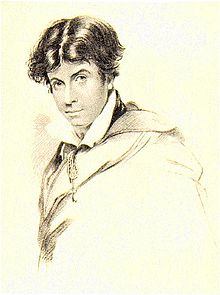
Cupid Drowned
T’other day as I was twining
Roses, for a crown to dine in,
What, of all things, ‘mid the heap,
Should I light on, fast asleep,
But the little desperate elf,
The tiny traitor, Love, himself!
By the wings I picked him up
Like a bee, and in a cup
Of my wine I plunged and sank him,
Then what d’ye think I did?—I drank him.
Faith, I thought him dead. Not he!
There he lives with tenfold glee;
And now this moment with his wings
I feel him tickling my heart-strings.
James Henry Leigh Hunt
(1784 – 1859)
Cupid Drowned
From: Poems That Every Child Should Know
• fleursdumal.nl magazine
More in: # Classic Poetry Archive, Archive G-H, Archive G-H, Hunt, Leigh

The Dying Slave
Faint-gazing on the burning orb of day,
When Afric’s injured son expiring lay,
His forehead cold, his labouring bosom bare,
His dewy temples, and his sable hair,
His poor companions kissed, and cried aloud,
Rejoicing, whilst his head in peace he bowed:—
Now thy long, long task is done,
Swiftly, brother, wilt thou run,
Ere to-morrow’s golden beam
Glitter on thy parent stream,
Swiftly the delights to share,
The feast of joy that waits thee there.
Swiftly, brother, wilt thou ride
O’er the long and stormy tide,
Fleeter than the hurricane,
Till thou see’st those scenes again,
Where thy father’s hut was reared,
Where thy mother’s voice was heard;
Where thy infant brothers played
Beneath the fragrant citron shade;
Where through green savannahs wide
Cooling rivers silent glide,
Or the shrill cicalas sing
Ceaseless to their murmuring;
Where the dance, the festive song,
Of many a friend divided long,
Doomed through stranger lands to roam,
Shall bid thy spirit welcome home!
Fearless o’er the foaming tide
Again thy light canoe shall ride;
Fearless on the embattled plain
Thou shalt lift thy lance again;
Or, starting at the call of morn,
Wake the wild woods with thy horn;
Or, rushing down the mountain-slope,
O’ertake the nimble antelope;
Or lead the dance, ‘mid blissful bands,
On cool Andracte’s yellow sands;
Or, in the embowering orange-grove,
Tell to thy long-forsaken love
The wounds, the agony severe,
Thy patient spirit suffered here!
Fear not now the tyrant’s power,
Past is his insulting hour;
Mark no more the sullen trait
On slavery’s brow of scorn and hate;
Hear no more the long sigh borne
Murmuring on the gales of morn!
Go in peace; yet we remain
Far distant toiling on in pain;
Ere the great Sun fire the skies
To our work of woe we rise;
And see each night, without a friend,
The world’s great comforter descend!
Tell our brethren, where ye meet,
Thus we toil with weary feet;
Yet tell them that Love’s generous flame,
In joy, in wretchedness the same,
In distant worlds was ne’er forgot;
And tell them that we murmur not;
Tell them, though the pang will start,
And drain the life-blood from the heart,—
Tell them, generous shame forbids
The tear to stain our burning lids!
Tell them, in weariness and want,
For our native hills we pant,
Where soon, from shame and sorrow free,
We hope in death to follow thee!
William Lisle Bowles
(1762 – 1850)
The Dying Slave
• fleursdumal.nl magazine
More in: # Classic Poetry Archive, *Archive African American Literature, Archive A-B, Archive A-B, Black Lives Matter, Racism
Thank you for reading Fleurs du Mal - magazine for art & literature